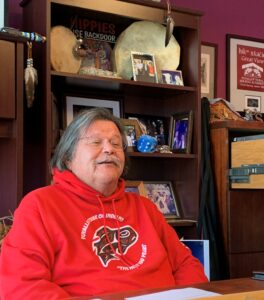For two decades, one of the most frustrating obstacles to tribes reclaiming certain stolen land was state law, specifically law that prevented environmental mitigation property from going through the fee-to-trust process.
It often worked this way: The state Department of Transportation would ask a tribe for right-of-way to complete a construction project. In exchange the state would transfer land to the tribe.
But there was a catch: If the land included environmental mitigation properties in the transfer, then by state law, the tribal government would have to waive sovereign immunity and agree not to place property into trust status.
The restriction could easily be a non-starter. It could be doubly insulting because environmental mitigation projects usually were there to protect fisheries that are crucial to tribes. More broadly, it represented a major obstacle to tribes getting back stolen land. Puyallup Tribal Chairman Bill Sterud recently gave testimony to House and Senate committees that put the history of lost land squarely on the table.
“Since the Treaty of the Medicine Creek, the Puyallup Tribe has seen almost a complete loss of its traditional reservation land base,” Chairman Sterud testified Feb. 7 before the Senate Transportation Committee. “Through various illegal transactions and mismanagement by the federal government, the Tribe lost about 99 percent of almost 18,000 acres set aside for the Puyallup Reservation.”
House Bill HB1934 and Senate Bill 5930 would lift the restriction. In a sign of how times have changed, the state Department of Transportation supports the legislation.
“The law as currently written was requested by WSDOT in 2002,” said Megan Cotton, the department’s tribal and federal relations director. “Since then, WSDOT has come to realize that the additional restrictions that only apply to the transfer of sites to Tribal governments are burdensome and act as a deterrent to Tribal participation in these agreements. We are pleased to partner with the Puyallup Tribe to work towards making this a more fair and equitable law that is respectful of Tribal sovereignty.”
The legislation was prompted in large part by the SR167 corridor project, which will complete the highway that currently terminates in Puyallup. It would continue from there and build connections to I-5 and the Port of Tacoma. WSDOT and the Tribe negotiated an agreement that will give the state the access rights it needs for the highway work in exchange for transferring about 118 acres of land to the Tribe.
In terms of acreage, it will be one of the largest returns of land to the Tribe since the historic Land Claims Settlement Act. Much of the land, however, would be used for environmental mitigation to help restore salmon, protect waters and establish native plant life through the use of natural barriers near rechanneled streams.
That’s where the current law requiring the Tribe to waive sovereign immunity would kick in.
The bill moving through the Legislature would change all that, opening a faster avenue for tribes to reclaim their land and in a way that respects tribal sovereignty.






